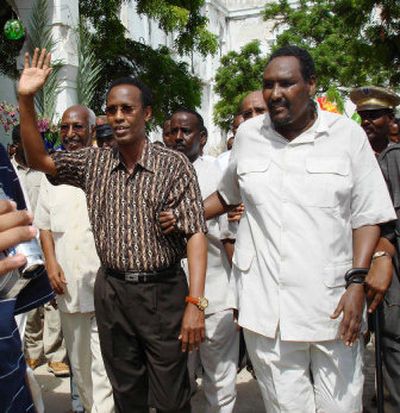World in brief: Mayor wants public to turn in weapons

A former warlord who for a time had been on the CIA payroll was sworn in Friday as mayor of Mogadishu and announced a plan to pacify this turbulent African capital within three months by requiring residents to turn in their guns.
“Weapons will be in the hands of the government and no one else,” Mohamed Dheere told a crowd at his inauguration.
But previous regimes have failed to disarm Mogadishu – the most dangerous city in Africa, where many families maintain AK-47s and other weapons for protection – and Dheere offered few details of his security plan.
Dheere’s appointment as mayor, which was announced by the interim prime minister, Ali Mohamed Gedi, follows the installation of another former warlord, Abdi Hasan “Qaybdid” Awale, as the national police chief. According to U.S. officials, both were briefly on the CIA payroll in 2006 under a covert program to fight the rise of the Islamists, a plan that fell apart when the Islamists drove the warlords from power last June.
Baghdad
Shiites protest criticism of cleric
Hundreds of angry Shiites poured onto the streets of two cities south of the Iraqi capital Friday to protest what they considered insults by Al-Jazeera television against Iraq’s most revered Shiite cleric, Grand Ayatollah Ali al-Sistani.
The protesters were angered by an Al-Jazeera talk show this week in which the presenter questioned al-Sistani’s leadership credentials.
Following Friday prayers in the southern cities of Basra and Najaf, al-Sistani supporters carried banners denouncing the channel and its host nation, the Gulf Arab state of Qatar.
“Yes, yes to al-Sistani,” read banners carried by some of the 1,000 protesters in Basra, Iraq’s second-largest city. They gathered outside the local offices of Iraq’s largest Shiite political party, the Supreme Council for the Islamic Revolution in Iraq, or SCIRI, which has close links to al-Sistani.
In the holy Shiite city of Najaf, where al-Sistani lives, several hundred protesters marched in the city’s old quarter in solidarity.
“Today, we burn down Al-Jazeera,” chanted the protesters who carried portraits of al-Sistani.
Kiev, Ukraine
Top officials agree on early elections
In an effort to resolve a political crisis, Ukraine’s president and prime minister agreed Friday to hold early parliamentary elections this summer or fall.
The deal, which sets the stage for a fresh match between the political camps that faced off during Ukraine’s Orange Revolution, is a victory for pro-Western President Viktor Yushchenko, who had pressed for an early vote.
The power struggle has geopolitical implications, with Yushchenko’s camp favoring stronger ties with Europe and the United States, while Prime Minister Viktor Yanukovich and his supporters generally wish to ensure good ties with Russia.
“This is a very important event for Ukraine because it demonstrates that Ukraine is steadily moving along the road of democracy,” said Vadim Karasyov, director of the Institute for Global Strategies.
In an indication that hard bargaining still lies ahead, Yushchenko and Yanukovich immediately offered differing views on when the “early” election should be held. Yushchenko implied that a July date was likely, while Yanukovich said October would be best.
Both men, however, seemed convinced that an election would be held this year to resolve a political crisis that erupted in early April, when the president accused the prime minister of using unconstitutional means to cement his hold on power.